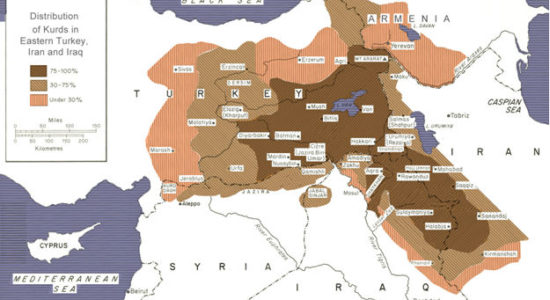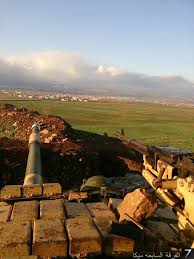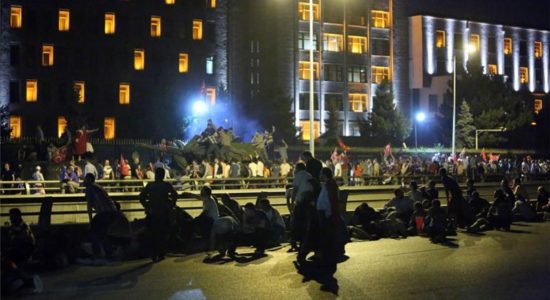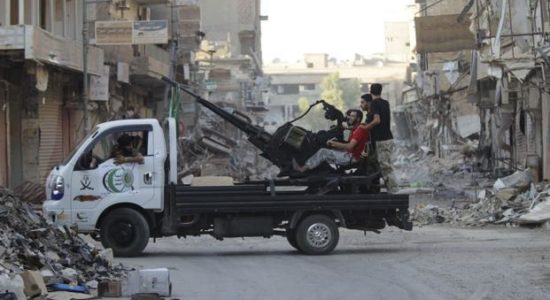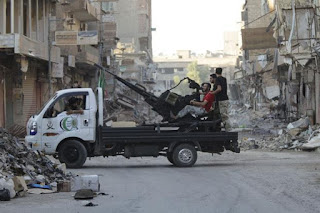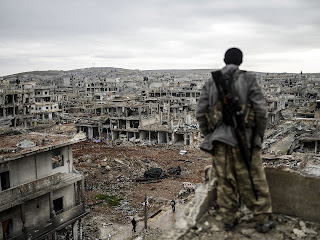الاتراك و معادلات تغيير مسار الازمات
واقع جديد تفرضه معطيات الازمات في المنطقة. محاولة الانقلاب في تركيا قدمت للرئيس التركي فرصة ذهبية لاعادة التموضع السياسي و انتهاج نهج براغماتي قادر على احداث تغيير حقيقي في السياسة التركية و الخروج من مأزق خيارات المرحلة السابقة.
انتهجت حكومة العدالة و التنمية منذ خروج احمد داوود اوغلو سياسة تهدف للخروج من مأزق العزلة الدولية عبر التلويح بالانقلاب على المواقف السابقة للحكومة التركية خصوصاً مواقفها من دول الاقليم و روسيا. الا ان الخطوات العملية لهذا التحول التركي بدأت فعلياً مع زيارة الرئيس اردوغان الى سان بطرسبرغ و الاتفاق على تحديد اولويات جديدة في طبيعة التعاطي التركي مع الازمة السورية.
وجهة النظر المنطقية تشير ان الاولوية التركية الحالية المتمثلة في مواجهة مشروع الدولة الكردية تضع تركيا و سوريا و ايران -التي سيزورها اردوغان قريباً- في نفس المصاف، مصاف الدول المتضررة من مشروع الدولة الكردية. المصلحة المشتركة لهذه الدول تجعل من مشروع الدول الكردية قاسماً مشتركاً لصيغة تفاهمات جديدة، الامر الذي يفسر الحديث التركي المتكرر مؤخراً عن ضرورة حماية وحدة الاراضي السورية، و هو تعبير عن قناعة تركية بأن استمرار الازمة السورية ووصولها الى نقطة المساس بوحدة الاراضي السورية سيكون انعكاسه الاكبر على الدولة التركية في المقام الاول. هذا ما يفسر السعي التركي الحثيث لمواجهة اي تحرك كردي قد يفضي مستقبلاً لمشروع انشاء دولة او كيان مستقل على الحدود التركية السورية.
التغير في طبيعة التعاطي التركي مع الازمات في المنطقة و على رأسها الأزمة السورية بات يمثل عامل التغيير الأكبر. فالتقارب الروسي التركي يعني منطقياً ان انقرة لم تعد تتعاطى مع الازمة السورية ضمن الخطوط الجمراء السابقة، خصوصاً فيما يتعلق برؤية اسقاط النظام في سوريا او اطالة امد الازمة. تركيا ستسعى لاستثمار هذا التقارب حصرياِ لافشال مشروع الدولة الكردية، خصوصاً ان سياسات كثير من الدول الكبرى تتماهى بوضوح مع هذا المشروع.
الولايات المتحدة تجد نفسها اليوم مضطرة للتحرك على الارض في سوريا دون وسطاء اي بمعنى اخر ان تركيا و سياستها في سوريا و خصوصاً في الشمال السوري لم تعد تصب في خانة الولايات المتحدة و مبدأ توازن القوى على الارض و الذي كانت تحدثه السياسة التركية و تستمره واشنطن سياسياً.
الاحداث الحالية تشير بوضوح الى ارتفاع في احتماليات التصعيد القادم في الشمال السوري خصوصاً في المناطق التي تسيطر أو قد تسيطر عليها القوات الكردية. السياسة التركية الحالية قد لا تعيد خلط اوراق الازمة السورية فقط بل قد تؤسس الى تغير ملفت في طبيعة و شكل الازمات في المنطقة. و يبقى السؤال الاهم يتمحور حول حقيقة التغير التركي و ان كان هذا التغيير منهجياً ام تكتيكاً مرحلياً، و كذلك قدرة السياسة التركية على احداث مثل هذه التحولات التي قد لا تتقاطع مع سياسة حلفاء أنقرة التاريخيين و قدرة أنقرة علي التعاطي مع الانعكاسات الامنية التي قد تطال الداخل التركي الناتجة عن مثل هذ التحولات.
د.عامر السبايلة

